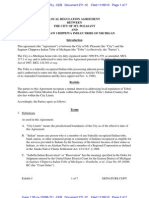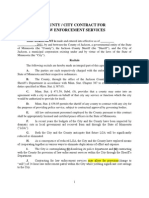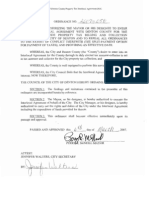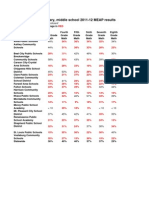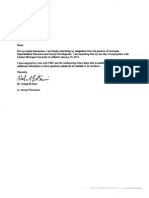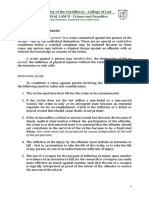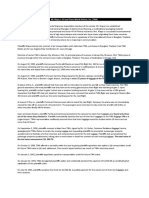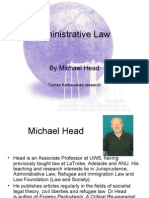City Revenue
City Revenue
Uploaded by
Mark RanzenbergerCopyright:
Available Formats
City Revenue
City Revenue
Uploaded by
Mark RanzenbergerCopyright
Available Formats
Share this document
Did you find this document useful?
Is this content inappropriate?
Copyright:
Available Formats
City Revenue
City Revenue
Uploaded by
Mark RanzenbergerCopyright:
Available Formats
Case 1:05-cv-10296-TLL -CEB Document 271-11 Filed 11/09/10 Page 1 of 7
REVENUE AGREEMENT
BETWEEN
THE CITY OF MT. PLEASANT
AND
THE SAGINAW CHIPPEWA INDIAN TRIBE OF MICHIGAN
Introduction
This agreement (the “Agreement”) is between the City of Mt. Pleasant (the “City”) and the
Saginaw Chippewa Indian Tribe of Michigan (the “Tribe”) (collectively, the “Parties”).
The City is a Michigan home rule city duly organized under 1909 PA 279, as amended, MCL
117.1 et seq. and is authorized to enter into this Agreement pursuant to the Urban Cooperation
Act of 1967, MCL 124.501 et seq.
The Tribe is a federally recognized Indian tribe possessing inherent powers of self-government,
and is authorized to enter into this Agreement pursuant to Articles VI(1)(a), (i), (j), (n), and (o)
of its Amended Constitution and By-laws (approved Nov. 4, 1986).
Recitals
The parties to this Agreement recognize a mutual interest in resolving issues related to certain
lost City taxes in circumstances where Tribal Fee Lands within the City Limits (defined below)
are taken into trust by the United States for the benefit of the Tribe.
Accordingly, the Parties agree as follows:
Terms
1. Definitions
As used in this Agreement:
A. “BIA” stands for Bureau of Indian Affairs.
B. “City Limits” means the jurisdictional boundaries of the City as of the effective date of
this Agreement.
C. “DOI” stands for Department of the Interior.
D. “Isabella Indian Reservation” or “Reservation” has the meaning specified in the Order for
Judgment entered by the United States District Court for the Eastern District of Michigan
in Saginaw Chippewa Indian Tribe of Michigan v. Granholm, et al., Case No. 05-10296-
BC (the “Court Order”).
E. “City Taxes” means taxes levied by the City or a public body corporate created by the
City that is a component entity of the City for auditing purposes and that operates only
within the City’s jurisdictional limits for operating and debt purposes (e.g., the
Downtown Development Authority). Except as otherwise stated in the preceding
Exhibit I 1 of 7 SIGNATURE COPY
Case 1:05-cv-10296-TLL -CEB Document 271-11 Filed 11/09/10 Page 2 of 7
sentence, City Taxes do not include any taxes collected by the City on behalf of any other
governmental entity, or any taxes levied by an entity other than the City.
F. “PILOT” stands for payment in lieu of taxes.
G. “SEV” stands for State Equalized Value.
H. “Tribal Fee Lands” means any parcel of land within the Reservation that is owned in fee
simple by the Tribe.
I. “Tribal Member” means an enrolled member of the Tribe.
J. “Tribal-Member-Fee Lands” means any parcel of land within the Reservation that is
owned in fee simple by any Tribal Member.
2. PILOT Payments to the City
A. For Tribal Fee Lands within the City Limits and within the Isabella Reservation that that
the DOI approves to be placed into trust on behalf of the Tribe, the Tribe must annually
pay in perpetuity a PILOT equal to 50% of the amount of the City-Tax due if calculated
at the rate last levied against the property the year it was placed in trust. To calculate this
amount, the parties must use: (i) the last Property-Tax rate in place as of the year the
property was placed in trust; and (ii) the highest SEV of the property at any time from the
date the Tribe acquired it to the time it is accepted into trust. This means that the PILOT
must be calculated using the last Property-Tax rate at the time the property is placed in
trust, regardless of whether it is higher or lower than earlier rates. But the PILOT must
be calculated using the highest SEV that applied to the property at any time that the Tribe
owned the property, regardless of whether the property has a lower SEV when taken into
trust than when the Tribe first acquired it.
B. The SEV and Property-Tax rate(s) may not be adjusted to calculate the PILOT for each
subsequent year that the PILOT is due. This means that the SEV and Property-Tax
rate(s) may not be adjusted for projected inflation, fluctuation in property values, the
consumer price index, or other any other reason. For example, if the highest SEV at the
time the property is placed into trust is $250,000, and if the last-applicable City-Tax rate
is 2% (i.e. 20 mils or $20 per every $1,000 of SEV), the City Tax due would be $5,000.
50% of that is $2,500. Consequently, after the land is placed into trust, under this
Agreement the Tribe would annually pay the City a PILOT of $2,500 for that property.
The City may not asses any City Taxes on a parcel taken into trust, no City Taxes are due
or payable on the parcel, and the Tribe does not owe the City any other payment, PILOT
or otherwise.
C. If a parcel of Tribal Fee Land is placed in trust on or before November 30 of a given year,
then the Tribe must pay the entire amount of the PILOT for that parcel by December 31
of that same year. If a parcel of Tribal Fee Land is placed in trust after November 30 of a
given year, then the Tribe must pay the entire amount of the PILOT for that parcel by
January 31 of the following year. The PILOT includes all City Tax otherwise owed or
assessed for the year in which the property is taken into trust. To the extent that the Tribe
Exhibit I 2 of 7 SIGNATURE COPY
Case 1:05-cv-10296-TLL -CEB Document 271-11 Filed 11/09/10 Page 3 of 7
made any property tax payments on that parcel for City Taxes for that year, the City must
credit those payments against the PILOT.
D. If the PILOT is not paid by the due date in Paragraph 2(C), the Tribe must also pay
interest at the rate of .75 percent per month, or portion of a month that it has not been
paid.
E. The City maintains the right to object to the Tribe’s trust applications after the date of this
Agreement, but if it does so, the PILOT described in Paragraph 2(A) must be reduced
according to the following formula:
i. If the City offers comments related to the Tribe’s written request to the
Superintendent of the relevant BIA agency office (or other relevant official) to take
land into trust, and the City objects to placement of the land into trust based upon
assertions of potential impacts on property-tax collection, special assessments,
regulatory jurisdiction, or any other ground, but does not thereafter appeal the
Superintendent’s decision to take land into trust (if and when issued), the City forfeits
the first six years of the PILOT. See 25 C.F.R. §§ 151.10, 151.12 (as may be
amended from time to time).
ii. If the City appeals the Superintendent’s decision to take land into trust to the BIA
Regional Director (or other relevant official), but does not appeal an adverse decision
further, and the land is thereafter taken into trust, the City forfeits the first 10 years of
the PILOT. See id.; 25 C.F.R. Part 2 (as may be amended from time to time).
iii. If the City appeals the BIA Regional Director’s adverse decision to the Interior Board
of Indian Appeals (or other relevant appeals body) or beyond, and if at the conclusion
of the City’s appeals, the land is taken into trust, the City forfeits the first 14 years of
the PILOT. See id.
F. The City has not objected to and must not offer objections to any of the Tribe’s trust
applications pending as of the date of this Agreement, and the City must not appeal the
Superintendent’s decision to take these lands into trust (if and when issued).
G. Tribal Fee Lands and Tribal-Member-Fee Lands within the City Limits are subject to all
applicable real- and personal-property taxes unless the United States Supreme Court rules
otherwise. The Tribe must not seek such a ruling from the United States Supreme Court
or the Sixth Circuit Court of Appeals.
H. The Tribe must continue to timely pay City Taxes that the City could otherwise collect on
Tribal Fee Lands until the year that the land is put in trust, regardless of whether the City
objects to the trust application or appeals a decision of the DOI, as described in Section
2(E) of this Agreement. “Timely” means on or before the date before which interest or
penalties accrue under the City’s normal tax-collection rules.
I. The City must not specially assess any Tribal Fee Lands or personal property owned by
the Tribe without the Tribe’s prior written consent.
Exhibit I 3 of 7 SIGNATURE COPY
Case 1:05-cv-10296-TLL -CEB Document 271-11 Filed 11/09/10 Page 4 of 7
J. If the Tribe acquires fee land against which the City has already levied special
assessments and the land is then taken into trust, and if by the terms of the special
assessment the assessments would have otherwise continued to be collected for any
period of time after the land is then taken into trust, the Tribe may either: (i) pay as a
lump sum the outstanding principal amount of that special assessment plus any accrued
interest in full within 30 days of the date the land in put into trust; or (ii) agree in writing
to continue to pay the special-assessment installments when they would otherwise be due
if the property were not in trust. The City must not impose any new special assessments
on any land held in trust, and is not be entitled to any payments in lieu of any special
assessments the City might have imposed on the land if it was held in fee.
3. Duration, Revocation, and Disputes
A. This Agreement remains in effect in perpetuity unless the Parties terminate the
Agreement by mutual written consent of both Parties. The Parties do not require Court
approval or other filing to terminate the Agreement under this provision.
B. To the extent that the City Limits change in the future and such change either excludes or
incorporates any Tribal Fee Lands that would not otherwise have been included within
the City, the Parties may by mutual consent negotiate in good faith regarding any needed
changes to this Agreement.
C. On or before the five-year anniversary of the effective date of this Agreement, and at
five-year intervals after the first meeting, the Parties must meet to discuss in good faith
any issues or concerns regarding any aspect of this Agreement.
D. The United States District Court for the Eastern District of Michigan (the “Court”) has
continuing jurisdiction to resolve disputes under this Agreement under the terms set forth
in this Agreement.
E. Notwithstanding the foregoing, neither Party may initiate an action in the Court until and
unless the Parties have mediated their disputes as provided herein. The Parties intend to
resolve any disputes informally and promptly through good-faith negotiations between
the Parties. If a dispute arises under or concerning this Agreement, the Parties must
proceed as follows:
i. The initiating Party must send written notice to the recipient Party setting forth the
particulars of the dispute and a suggested resolution of the issue. The recipient Party
must respond in writing within 30 days and must respond with specificity to the
initiating Party’s dispute and suggested resolution.
ii. If this does not resolve the dispute, the Parties must meet and confer in person within
30 days after the recipient Party’s response to attempt to resolve the matter.
iii. If this does not resolve the dispute, the Parties must submit to mediation with a
mutually acceptable private mediator. Either Party may initiate this mediation at any
time after the meeting contemplated above. The Parties agree to select a mediator
with background and experience in: the subject matter that gave rise to the dispute;
Exhibit I 4 of 7 SIGNATURE COPY
Case 1:05-cv-10296-TLL -CEB Document 271-11 Filed 11/09/10 Page 5 of 7
tribal governments; local governments; and relevant laws, practices, procedures, and
operations. In order to decide upon an acceptable mediator, the Parties agree to
timely exchange lists of proposed mediators, including the mediators’ résumés,
confirmation of each proposed mediator’s willingness to act as mediator in the
dispute, any potential conflicts (if known), any other qualifications, and the proposed
mediators’ hourly rates. Each Party may strike unacceptable names from the list and
number the remaining names in order of preference. The Parties retain the right to
reject any proposed mediator, but must make good-faith efforts to select an
acceptable mediator under this Agreement. The Parties agree to abide by the
mediator’s own rules regarding the conduct of the mediation or such other rules upon
which the Parties may agree. The Parties must evenly split the costs of mediation.
iv. If mediation is unsuccessful, either Party may then petition the Court, and either Party
may lodge appeals with the 6th Circuit Court of Appeals and/or the Supreme Court of
the United States, but no other court has jurisdiction to hear the dispute. The Court
may not award either Party any monetary damages (except that the Court may order
payments that it determines are due under this Agreement), but it may declare the
rights of the Parties and order compliance under this Agreement. The losing Party
must bear the prevailing Party’s Court costs and attorney’s fees. Each Party expressly
and irrevocably waives any right to trial by jury.
4. Retention of Legal Rights
A. This Agreement does not affect any other agreements that either Party may enter in to
with any third party now or in the future.
B. This Agreement may not be construed as a waiver of either Party’s sovereign immunity
except and only to the extent that both Parties waive their sovereign immunity to the
limited extent necessary to effectuate Paragraph 3(D) of this Agreement. This limited
waiver of sovereign immunity does not waive the immunity of any official, employee, or
agent of either Party.
C. This Agreement does not affect any ability the City has under applicable state law to levy
and collect real and personal property taxes or other revenues from any other lands within
the City Limits that are not Tribal Trust Lands, Tribal Fee Lands, or Tribal-Member-Fee
Lands.
5. Amendments
This Agreement can only be amended by a written instrument signed by the duly authorized
representative of each Party. The Parties do not require Court approval or other filing to
amend the Agreement under this provision.
6. Severability
The provisions of this Agreement are severable. If any provision of this Agreement is held
invalid or unenforceable, the remainder of the Agreement remains in effect, unless
Exhibit I 5 of 7 SIGNATURE COPY
Case 1:05-cv-10296-TLL -CEB Document 271-11 Filed 11/09/10 Page 6 of 7
terminated as provided for in this Agreement. However, if any provision of this Agreement
is severed from the Agreement, then the Parties must promptly meet and negotiate in good
faith to achieve the intended purpose of the severed provision in a manner that is valid and
enforceable under applicable law.
7. Relationship to Other Agreements
A. This Agreement constitutes the entire Agreement between the Parties.
B. Upon the execution of this Agreement, the Parties mutually rescind all previously entered
written Agreements between them regarding the topics in this Agreement.
C. If this Agreement conflicts with the Court Order, the terms of this Agreement governs.
8. Notice
Written notices required or permitted to be given under this Agreement are sufficient if they
are sent by registered or certified mail, or by other means mutually acceptable to the Parties.
In the case of the City, notices must be sent to:
City Manager
City of Mt. Pleasant
320 West Broadway
Mt. Pleasant, MI 48858
With a copy to:
City Treasurer
City of Mt. Pleasant
320 West Broadway
Mt. Pleasant, MI 48858
In the case of the Tribe, notices must be sent to:
Tribal Chief Financial Officer
Saginaw Chippewa Indian Tribe
7070 East Broadway
Mt. Pleasant, MI 48858
With a copy to:
General Counsel
Legal Department
Saginaw Chippewa Indian Tribe
7070 East Broadway
Mt. Pleasant, MI 48858
Exhibit I 6 of 7 SIGNATURE COPY
Case 1:05-cv-10296-TLL -CEB Document 271-11 Filed 11/09/10 Page 7 of 7
9. Counterparts
This Agreement may be executed in several counterparts, each of which is an original, but all
of which together constitute a single instrument.
10. Authority
The undersigned represent that they are authorized to execute this Agreement on behalf of
the Tribe and City, respectively.
11. Preparation of Agreement
The Parties drafted this Agreement and entered into it after careful review and upon the
advice of competent counsel. It must be construed as if it were mutually drafted, and may
not be construed more strongly for or against either Party.
12. Effective Date
This Agreement is effective on the date that the Court Order is signed by the Court, provided
that the Court enters the Court Order as it was approved by the City and Tribe. Changes to
the form of the Court Order (e.g., pagination, fonts, margins, etc.) do not affect the effective
date of this Agreement, but this Agreement is not effective and does not bind the parties if
the language of the Court Order is not identical to the language approved by the City and
Tribe.
SAGINAW CHIPPEWA INDIAN TRIBE CITY OF MT. PLEASANT
OF MICHIGAN
s/ Dennis V. Kequom s/ James Holton
Dennis Kequom, Sr., Tribal Chief James Holton, Mayor
11/8/10 11/8/10
Date signed Date signed
s/ Jeremy Howard
Jeremy Howard, City Clerk
11/8/10
Date signed
The United States District Court for the Eastern District of Michigan entered the Order for
Judgment in Case No. 05-10296 on _____________________, 2010.
Exhibit I 7 of 7 SIGNATURE COPY
You might also like
- Consumer Court Complaint DraftDocument6 pagesConsumer Court Complaint DraftMohit Saras80% (5)
- Aba Standards For Criminal Justice PDFDocument296 pagesAba Standards For Criminal Justice PDFNecandi0% (1)
- Waste Pro Lawsuit Against Cape CoralDocument101 pagesWaste Pro Lawsuit Against Cape CoralOlivia HydeNo ratings yet
- Zobel Vs ManilaDocument20 pagesZobel Vs Manilao6739No ratings yet
- Sterling Agreement in DerbyDocument10 pagesSterling Agreement in DerbyThe Valley IndyNo ratings yet
- City ZoningDocument8 pagesCity ZoningMark RanzenbergerNo ratings yet
- Vision Property SettlementDocument5 pagesVision Property SettlementWCPO 9 NewsNo ratings yet
- City LocalRegsDocument7 pagesCity LocalRegsMark RanzenbergerNo ratings yet
- JPD-JCSO Draft ContractDocument10 pagesJPD-JCSO Draft ContractLivewire Printing CompanyNo ratings yet
- Downtown TIF Grant Agreement Template FinalDocument9 pagesDowntown TIF Grant Agreement Template Finalmustafa jiniaNo ratings yet
- Real Property Chapter 5 6 7Document40 pagesReal Property Chapter 5 6 7Cherryjane RuizNo ratings yet
- Mbia/assured Guaranty Complaint Re GO Unsecured Status in Detroit Bankruptcy Case PDFDocument31 pagesMbia/assured Guaranty Complaint Re GO Unsecured Status in Detroit Bankruptcy Case PDFChris HerzecaNo ratings yet
- Proposed Settlement WongDocument7 pagesProposed Settlement WongJoe EskenaziNo ratings yet
- State IncomeTaxDocument5 pagesState IncomeTaxMark RanzenbergerNo ratings yet
- Ansonia Bond ResolutionDocument4 pagesAnsonia Bond ResolutionThe Valley IndyNo ratings yet
- Estate Tax: 86, NIRC)Document15 pagesEstate Tax: 86, NIRC)Cesyl Patricia BallesterosNo ratings yet
- Memos - All Combined RedactedDocument54 pagesMemos - All Combined Redactedbranax2000No ratings yet
- Steps Tobe Taken To Transfer Property Card Inthe Name PurchaseDocument3 pagesSteps Tobe Taken To Transfer Property Card Inthe Name PurchaseGaurav Mehta100% (1)
- SFMTA Public Relations ContractDocument31 pagesSFMTA Public Relations ContractReset San FranciscoNo ratings yet
- Chris Caso Contract City of DallasDocument5 pagesChris Caso Contract City of DallasMede NixNo ratings yet
- Utilities - Delinquency - 2018-05 (PDF)Document5 pagesUtilities - Delinquency - 2018-05 (PDF)kush09edwwnNo ratings yet
- Reviewer in LGC..Document923 pagesReviewer in LGC..Carmela Paola R. DumlaoNo ratings yet
- Scotty's LandingDocument16 pagesScotty's Landingal_crespo_2No ratings yet
- Jersey City Census Appeal ContractDocument34 pagesJersey City Census Appeal ContractThe Jersey City IndependentNo ratings yet
- SO2019-2583: Lincoln Yards Redevelopment AgreementDocument127 pagesSO2019-2583: Lincoln Yards Redevelopment AgreementjrNo ratings yet
- Mason - Agreement W Attachments (Fully Executed) 2022-05-03Document17 pagesMason - Agreement W Attachments (Fully Executed) 2022-05-03Anita WadhwaniNo ratings yet
- North Lake Highlands PID Petition With Exhbits A and BDocument6 pagesNorth Lake Highlands PID Petition With Exhbits A and BChristina Hughes BabbNo ratings yet
- Harteau Release of All Claims Final 8.30.17Document7 pagesHarteau Release of All Claims Final 8.30.17Adam BelzNo ratings yet
- Zuhu Wang SettlementDocument24 pagesZuhu Wang SettlementKristin LamNo ratings yet
- The Kiambu Finance Act 2020 21Document103 pagesThe Kiambu Finance Act 2020 21Njeri TimothysNo ratings yet
- Consolidated Edison Company of New York, Inc. v. United States, 10 F.3d 68, 2d Cir. (1993)Document9 pagesConsolidated Edison Company of New York, Inc. v. United States, 10 F.3d 68, 2d Cir. (1993)Scribd Government DocsNo ratings yet
- Tax Ordinance 2023Document4 pagesTax Ordinance 2023Zeff DuzonNo ratings yet
- Posados v. Manila, 274 U.S. 410 (1927)Document6 pagesPosados v. Manila, 274 U.S. 410 (1927)Scribd Government DocsNo ratings yet
- Boones Creek Economic Incentive ZoneDocument27 pagesBoones Creek Economic Incentive ZoneBrit StackNo ratings yet
- Real Estate Transfer DeclarationDocument2 pagesReal Estate Transfer Declarationjrothschild412No ratings yet
- IRS Filings Show Michael Avenatti Paid No Payroll Taxes For YearsDocument5 pagesIRS Filings Show Michael Avenatti Paid No Payroll Taxes For YearsJim HoftNo ratings yet
- Resident Citizen, Non-Resident Citizen, and Resident Alien DecedentsDocument6 pagesResident Citizen, Non-Resident Citizen, and Resident Alien DecedentsSophia Angelica Marie MarasiganNo ratings yet
- G.R. No. L-53961 June 30, 1987, National Development Company vs. Commissioner of Internal RevenueDocument4 pagesG.R. No. L-53961 June 30, 1987, National Development Company vs. Commissioner of Internal Revenuekim zeus ga-anNo ratings yet
- Contract Between The City of Denton and Denton CountyDocument12 pagesContract Between The City of Denton and Denton CountywatchdogsocietyNo ratings yet
- Grace MilanDocument12 pagesGrace Milanal_crespo_2No ratings yet
- Solicitation Document PDFDocument46 pagesSolicitation Document PDFlipseydremeNo ratings yet
- Town of Calhan, Colorado City Land UseDocument55 pagesTown of Calhan, Colorado City Land Useinsdjb37No ratings yet
- Subsidy Accountability BillDocument4 pagesSubsidy Accountability BillIan GaviganNo ratings yet
- Ground Lease by and Between City of San Jose (Lessor) and Ford Road Supportive Housing, Inc. (Lessee)Document24 pagesGround Lease by and Between City of San Jose (Lessor) and Ford Road Supportive Housing, Inc. (Lessee)Mussadaq RaufNo ratings yet
- Real Property TaxationDocument12 pagesReal Property TaxationJasper AlonNo ratings yet
- Jean Lim TAX 2019Document33 pagesJean Lim TAX 2019Faez JjampongNo ratings yet
- Tax QuizDocument4 pagesTax QuizAnonymous HRxZ2r6zWNo ratings yet
- Elmhurst Settlement With David GibsonDocument6 pagesElmhurst Settlement With David GibsonDavid GiulianiNo ratings yet
- Local Government Unit (Lgu) : Administrative StructureDocument4 pagesLocal Government Unit (Lgu) : Administrative StructureLaika Mae D. CariñoNo ratings yet
- Land Valuation: 2 X The Average Harvest of Three Normal Crop YearsDocument10 pagesLand Valuation: 2 X The Average Harvest of Three Normal Crop YearsCates TorresNo ratings yet
- BLGF Opinion Dated June 6 2017Document10 pagesBLGF Opinion Dated June 6 2017Taxation LawNo ratings yet
- Turlock Agreement For City Attorney ServicesDocument10 pagesTurlock Agreement For City Attorney ServicesKristin LamNo ratings yet
- Special Lecture Handouts in TaxationDocument24 pagesSpecial Lecture Handouts in TaxationTep DomingoNo ratings yet
- Taxation Law 2007 Bar Question and AnswerDocument12 pagesTaxation Law 2007 Bar Question and AnswerHenry M. Macatuno Jr.No ratings yet
- In The Circuit Court of St. Louis County State of MissouriDocument14 pagesIn The Circuit Court of St. Louis County State of MissouriLexipol_Media_GroupNo ratings yet
- Chapter 7Document6 pagesChapter 7KIANU STEVENo ratings yet
- Petitioner vs. vs. Respondent: en BancDocument5 pagesPetitioner vs. vs. Respondent: en BancVMNo ratings yet
- 06-28 Staff Report W AttachDocument125 pages06-28 Staff Report W AttachMatthew JensenNo ratings yet
- Creation and Conversion of Local Government UnitsDocument74 pagesCreation and Conversion of Local Government UnitsJamiah Obillo HulipasNo ratings yet
- Madison County 2017 Bond ResolutionDocument4 pagesMadison County 2017 Bond Resolutionthe kingfishNo ratings yet
- Tan Vs Valdehuesa Until Soncuya Vs AzarragaDocument6 pagesTan Vs Valdehuesa Until Soncuya Vs AzarragaPat EspinozaNo ratings yet
- National Federation of Independent Business v. SebeliusDocument193 pagesNational Federation of Independent Business v. SebeliusCasey SeilerNo ratings yet
- 2011-12 MidMichigan MEAPDocument2 pages2011-12 MidMichigan MEAPMark RanzenbergerNo ratings yet
- Report On Officer-Involved ShootingDocument5 pagesReport On Officer-Involved ShootingMark RanzenbergerNo ratings yet
- El Sawi ResignationDocument11 pagesEl Sawi ResignationMark RanzenbergerNo ratings yet
- Union Township Draft Master Plan, 20Document118 pagesUnion Township Draft Master Plan, 20Mark RanzenbergerNo ratings yet
- Mid Michigan Labor MarketDocument1 pageMid Michigan Labor MarketMark RanzenbergerNo ratings yet
- Unemployment Analysis - November 2010Document1 pageUnemployment Analysis - November 2010Mark RanzenbergerNo ratings yet
- State IncomeTaxDocument5 pagesState IncomeTaxMark RanzenbergerNo ratings yet
- State TaxDocument103 pagesState TaxMark RanzenbergerNo ratings yet
- Map ReservationDocument1 pageMap ReservationMark RanzenbergerNo ratings yet
- Persons Set 4 Case CompilationDocument287 pagesPersons Set 4 Case CompilationAnonymous bMJQuUO8nNo ratings yet
- G.R. No. 146698Document5 pagesG.R. No. 146698GH IAYAMAENo ratings yet
- Brown Versus Board of EducationDocument6 pagesBrown Versus Board of Educationlilbaier100% (2)
- Xi. Adoption Lazatin V Campos-Adoption FactsDocument47 pagesXi. Adoption Lazatin V Campos-Adoption FactsMichaella Claire LayugNo ratings yet
- Employee Code of Conduct - V4Document4 pagesEmployee Code of Conduct - V4MahiulhabibNo ratings yet
- Rights of The AccusedDocument168 pagesRights of The AccusedMrs. WanderLawstNo ratings yet
- Junior Philippine Institute of Accountants: PreambleDocument13 pagesJunior Philippine Institute of Accountants: PreambleLeah Jean Mae CuachinNo ratings yet
- Crimes Against Persons - Parricide Infanticide Homicide and Murder (Criminal Law 2) PDFDocument18 pagesCrimes Against Persons - Parricide Infanticide Homicide and Murder (Criminal Law 2) PDFbalba saraNo ratings yet
- Zamora V Multi WoodDocument8 pagesZamora V Multi Woodfjl_302711No ratings yet
- Dominion Insurance V Guevarra and AustriaDocument3 pagesDominion Insurance V Guevarra and AustriaPio MathayNo ratings yet
- Mapa v. CA and Trans-World Airlines, Inc. (TWA)Document3 pagesMapa v. CA and Trans-World Airlines, Inc. (TWA)Emma Ruby AguilarNo ratings yet
- 9 National Grains Authority vs. Iac (171 Scra 131) - DigestDocument3 pages9 National Grains Authority vs. Iac (171 Scra 131) - DigestJoy Navaja DominguezNo ratings yet
- Broach v. Ferrell Et Al (INMATE1) - Document No. 4Document4 pagesBroach v. Ferrell Et Al (INMATE1) - Document No. 4Justia.comNo ratings yet
- Constitutional Law II - Midterm PaperDocument42 pagesConstitutional Law II - Midterm PaperAndrea Gural De GuzmanNo ratings yet
- Administrative Law: by Michael HeadDocument13 pagesAdministrative Law: by Michael HeadtormmasNo ratings yet
- Section 91 Civil Procedure Code 1908Document3 pagesSection 91 Civil Procedure Code 1908Bilawal MughalNo ratings yet
- Annotated BibliographyDocument3 pagesAnnotated Bibliographyapi-286656851No ratings yet
- Matrimonial Dispute Judgment by Supreme CourtDocument57 pagesMatrimonial Dispute Judgment by Supreme CourtLatest Laws TeamNo ratings yet
- Real Estate Mortgage Know All Men by These PresentsDocument2 pagesReal Estate Mortgage Know All Men by These PresentsKatrine ManaoNo ratings yet
- MT Juliet LawsuitDocument9 pagesMT Juliet LawsuitAnonymous GF8PPILW5No ratings yet
- One Person CompanyDocument15 pagesOne Person Companyravi aryaNo ratings yet
- Acknowledgement Receipt, Waiver & QuitclaimDocument2 pagesAcknowledgement Receipt, Waiver & Quitclaimjowel cloma100% (1)
- 136 Scra 487 - Us Vs RuizDocument7 pages136 Scra 487 - Us Vs RuizMj Garcia100% (1)
- Trusts ARTICLE 1440Document15 pagesTrusts ARTICLE 1440Jv Fermin100% (2)
- Doctrine of Eclipse: Prof. S. P. Srivastava Department of Law and GovernanceDocument15 pagesDoctrine of Eclipse: Prof. S. P. Srivastava Department of Law and GovernanceKanooni SalahNo ratings yet
- Prospective and Retrospective Effect of Judicial Decisions in IrelandDocument33 pagesProspective and Retrospective Effect of Judicial Decisions in IrelandRita CahillNo ratings yet
- People V Orita (1990)Document2 pagesPeople V Orita (1990)Cristelle Elaine ColleraNo ratings yet
- Session 2 PPA in GhanaDocument24 pagesSession 2 PPA in GhanaOFORINo ratings yet







